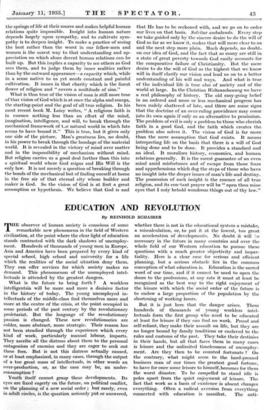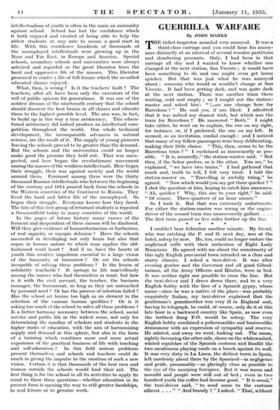EDUCATION AND REVOLUTION
By REINHOLD SCHAIRER
THE observer of human society is conscious of some remarkable new phenomena in the field of Western civilization, at the point where the clear light of education stands contrasted with the dark shadows of unemploy- ment. Hundreds of thousands of young men in Europe, Asia and America have been prepared by every kind of special school, high school and university for a life which the realities of the social situation deny them. They can offer services for which society makes no demand. This phenomenon of the unemployed intel- lectuals is attended by the greatest dangers.
What is the future to bring forth ? A workless intelligentsia will be more and more a decisive factor in the history of today. The young unemployed in- tellectuals of the middle-class find themselves more and more at the centre of the crisis, at the point occupied in some periods of the past century by the revolutionary proletariat. But the language of the revolutionary passion is changed. These new revolutionaries are colder, more abstract, more strategic. Their reason has not been steadied through the experience which every kind of work, particularly manual labour, imparts. They ascribe all the distress about them to the personal antagonism of enemies and they are eager to seek out these foes. But is not this distress actually caused, or at least emphasized, in many cases, through the output of a too great mass of intellectuals, in other words an over-production, or, as the case may be, an under- consumption ? • Youth itself cannot grasp these developments. Its eyes are fixed eagerly on the future, on political conflict, on the planning of a new social order ; but rarely, even in adult circles, is the question seriously put or answered, whether there is not in the educational system a mistake, a miscalculation, or, to put it at the lowest, too great an acceleration of developments. No doubt it will be necessary in the future in many countries and over the whole field of our Western education to pursue these questions with a much greater objectivity and impar- tiality. Here is a clear case for serious and efficient planning, but a serious obstacle lies in the common conception of what education is. Education is the sacred word of our time, and if it cannot be used to open the doors to the professions, at any rate it must at least be recognized as the best way to the right enjoyment of the leisure with which the social order of the future is to endow a large proportion of the population by the shortening of working hours.
But it is just here that the danger arises. These hundreds of thousands of young workless intel- lectuals form the first group who need to be educated at least for leisure if they can find no work. Proud and self-reliant, they make their assault on life, but they are no longer bound by family traditions or enslaved to the rules and customs of the past. They take their destinies in their hands, but all that faces them in many cases is leisure and the unlimited timelessness of unemploy- ment. Are they then to be counted fortunate ? On the contrary, what might seem to the hard-pressed business man of our times the greatest good fortune, to have for once some leisure to himself, becomes for them the worst disaster. To be compelled to stand idle is poles apart from the quiet enjoyment of leisure. The fact that work as a basis of existence is absent changes everything. Often a radical aversion from everything connected with education is manifest. The anti- intellectualism of youth is often in the main an animosity against school. School has lost the confidence which it both enjoyed and created of being able to help the ablest students at any rate to secure a good start in life. With this confidence hundreds of thousands of the unemployed intellectuals were growing up in the Near and Far East, in Europe and America. Special schools, secondary schools and universities were always admired and regarded as the great liberator from the hard and oppressive life of the masses. This liberator promised to confer a life of full leisure which the so-called educated classes enjoyed.
What, then, is wrong ? Is it the teachers' fault ? The teachers, after all, have been only the executors of the will of public opinion for generations. It was one of the noblest dreams of the nineteenth century that the school should discover the best brains in all classes and educate them to the highest possible level. The aim was, in fact, to build up in this way a true aristocracy. This educa- tional aristocracy did indeed produce an intellectual Com- petition throughout the world. Our whole technical development, the incomparable advances in natural science, are the result of it. The supply of young pioneers leaving the schools proved to be greater than the demand. But the schools and the universities could no longer make good the promise they held out. That was unex- pected, and here began the revolutionary movement among the masses of the workless intellectuals. Here began their struggle, their war against society and the world around them. Foremost among them were the thirty thousand Russian intellectuals who between the beginning of the century and 1914 poured back from. the schools in the Western countries of the Continent to Russia. They lived the hard and bitter life of the unemployed. So began their struggle. Everyone knows how they fared. The fate of this first group of returned students is repeated a thousandfold today in many countries of the world.
In the pages of future history many causes of the ferment and desperation of these masses will be disclosed. Will they give evidence of humanitarianism or barbarism; of real sagacity or 'myopic delusion ? Have the schools succeeded in developing not only brain but also that organ in human nature to which man applies the old- fashioned word heart ? And if so, have the hearts of youth this creative impulsion essential to a large vision of the humanity of tomorrow ? Or are the schools incapable of solving these problems ? Is the lesson of solidarity teachable ? It springs to life marvellously among the masses who find themselves in want, but how is it with the civil servant, the teacher, the business manager, the bureaucrat, so long as they are- untouched by personal need ? Or has the process of selection failed ? Has the school set brains too high as an element in the selection of the various human qualities ? Or is it asking too much of the school to solve all these problems ? Is a better harmony necessary between the school, social service and public life in the widest sense, not only for determining the number of scholars and students in the higher ranks of education, with the aim of harmonizing supply and demand in this sphere, but also in the form of a training which combines more and more actual experience of the practical business of life with teaching and self-education ? In this field serious problems present themselves, and schools and teachers could do much in giving the impulse to the creation of such a new vision. Certain it is that thousands of the best men and women outside the schools would lend their aid. The first thing is for the school in all its activities to apply its mind to these three questions—whether education in its present form is opening the way to still greater hardships, to real leisure or to genuine work.







































 Previous page
Previous page